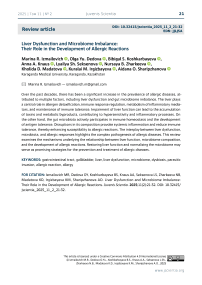Liver dysfunction and microbiome imbalance: their role in the development of allergic reactions
Автор: Izmailovich Marina R., Dedova Olga Yu., Koshkarbayeva Bibigul S., Knaus Anna A., Seksenova Lyailya Sh., Zharkeeva Nursaya B., Madatova Kholida D., Irgizbayeva Kuralai M., Sharipzhanova Aidana O.
Журнал: Juvenis scientia @jscientia
Рубрика: Обзорные статьи
Статья в выпуске: 2 т.11, 2025 года.
Бесплатный доступ
Over the past decades, there has been a significant increase in the prevalence of allergic diseases, attributed to multiple factors, including liver dysfunction and gut microbiome imbalance. The liver plays a central role in allergen detoxification, immune response regulation, metabolism of inflammatory mediators, and maintenance of immune tolerance. Impairment of liver function can lead to the accumulation of toxins and metabolic byproducts, contributing to hypersensitivity and inflammatory processes. On the other hand, the gut microbiota actively participates in immune homeostasis and the development of antigen tolerance. Disruptions in its composition provoke systemic inflammation and reduce immune tolerance, thereby enhancing susceptibility to allergic reactions. The interplay between liver dysfunction, microbiota, and allergic responses highlights the complex pathogenesis of allergic diseases. This review examines the mechanisms underlying the relationship between liver function, microbiome composition, and the development of allergic reactions. Restoring liver function and normalizing the microbiome may serve as promising strategies for the prevention and treatment of allergic diseases.
Gastrointestinal tract, gallbladder, liver, liver dysfunction, microbiome, dysbiosis, parasitic invasion, allergic reaction, allergy
Короткий адрес: https://sciup.org/14133132
IDR: 14133132 | DOI: 10.32415/jscientia_2025_11_2_21-32


